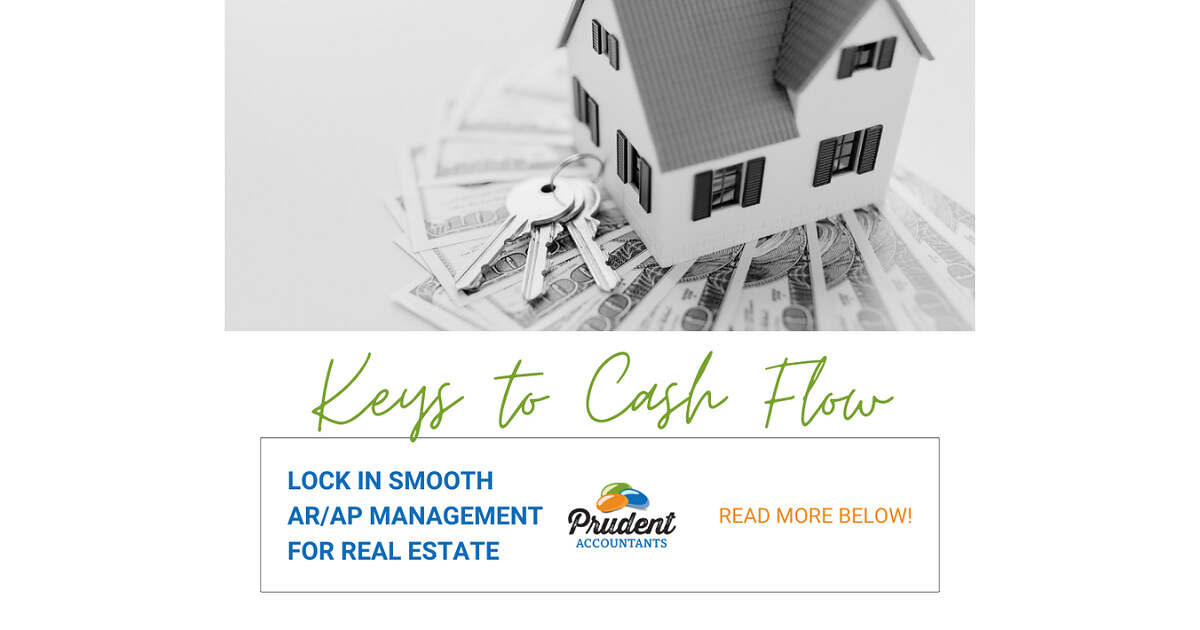Mastering Accounts Receivable and Payable Management in Real Estate for Smooth Cash Flow

In the world of real estate, managing cash flow is not just important—it’s vital. Whether you’re a property manager overseeing multiple units or an investor building a portfolio, the way you handle your accounts receivable (AR) and accounts payable (AP) can make or break your financial health. From managing tenant payments to keeping vendors happy, effective AR/AP management can prevent bottlenecks in cash flow, reduce the risk of late payments, and improve relationships across the board.
But real estate, unlike many other industries, comes with unique challenges. The nature of rental cycles, large capital expenditures, and variable income streams requires a specialized approach to managing finances. That’s why this blog post is dedicated to helping you understand the best practices for optimizing AR and AP in real estate. By following these steps, you’ll not only improve your financial health but also streamline your operations for long-term success.
Why AR/AP Matters in Real Estate
At the core of any business is its cash flow, and this is especially true in real estate, where income is largely dependent on tenant payments, property sales, and sometimes inconsistent revenue streams. Accounts receivable refers to the money owed to you, typically from tenants or buyers, while accounts payable represents the money you owe to vendors, suppliers, contractors, or service providers.
In real estate, poor AR/AP management can lead to severe cash flow problems, making it difficult to cover operating expenses, reinvest in properties, or meet financial obligations. Missed payments from tenants, late payments to vendors, and unexpected maintenance costs can quickly snowball into larger financial headaches.
By mastering the processes for collecting receivables and handling payables, you ensure that your business has the working capital it needs to thrive. Whether it’s keeping track of rent collection, staying on top of repairs, or managing multiple vendors, getting your AR/AP right is the foundation for a healthy real estate operation.
Unique Challenges in Real Estate AR/AP Management
Real estate presents a distinct set of challenges when it comes to managing accounts receivable and payable. Unlike many businesses with consistent monthly revenue streams, real estate operations often involve irregular income, such as rent collections that depend on tenant payment schedules, and high capital expenses, like property maintenance or upgrades. These factors make effective AR/AP management even more critical.
- Tenant Turnover and Fluctuating Rental Income: Rental properties are subject to tenant turnover, leading to fluctuations in cash flow. When tenants move out, landlords must often wait weeks or even months to fill vacancies, impacting rent receivables.
- Large, Sporadic Expenses: Properties require regular maintenance, but unexpected costs can arise from repairs, renovations, or property taxes, all of which may not align neatly with your incoming payments.
- Seasonality in Commercial Real Estate: For commercial property owners, seasonality can impact both tenant payments and the need for facility management services, adding another layer of complexity to AR/AP management.
- Diverse Vendor Relationships: Managing accounts payable in real estate often means handling payments to multiple vendors—contractors, maintenance teams, property management companies, and suppliers—all of whom may have different payment terms.
Because of these challenges, real estate professionals need a robust system to manage their accounts receivable and payable efficiently. Let’s explore some best practices to help you overcome these obstacles.
Best Practices for Streamlining Accounts Receivable in Real Estate
To maintain a healthy cash flow, you need to ensure that rent and other payments from tenants or buyers are collected promptly. Accounts receivable issues are common in real estate due to the complexities of tenant management and the unpredictable nature of property investments. Here are some proven strategies to optimize your receivables.
1. Automation in Invoicing and Collections
One of the most effective ways to improve AR in real estate is to automate invoicing and collections. Property management software with built-in accounting features can automatically generate rent invoices, track payment due dates, and send reminders to tenants. This eliminates manual errors and ensures timely communication with tenants, helping you avoid late payments or missed receivables.
Additionally, you can set up automated late fees to encourage on-time payments. This can significantly reduce the time and effort required for collections while improving your cash flow.
2. Tenant Communication and Clear Terms
Clear communication with tenants is crucial to effective AR management. From the outset, tenants should be fully aware of their rent schedules, payment methods, and any late fee policies. Transparent and well-structured leases are key to ensuring that tenants know exactly when payments are due and what the penalties are for late payments.
Establish a routine for checking in with tenants before and after due dates to address any concerns and reduce the likelihood of delayed payments. If possible, offer multiple payment options—such as online payments or automatic bank transfers—to make the payment process seamless.
3. Incentivize Early Payments and Enforce Late Fees
Offering incentives for early payments, such as a slight discount on rent, can help improve cash flow by encouraging tenants to pay ahead of time. Conversely, enforcing late fees is a proven way to discourage late payments. Consistency is key: if tenants know that penalties will be applied uniformly for late payments, they’ll be more likely to meet their deadlines.
Effective Accounts Payable Management for Real Estate
While collecting money owed to you is important, managing your outflows—accounts payable—is equally critical. AP mismanagement can lead to strained vendor relationships, missed business opportunities, and cash shortages. Here are some strategies to streamline your accounts payable.
1. Vendor Relations and Timely Payments
Your relationship with vendors—whether they’re maintenance crews, construction companies, or service providers—is essential to keeping your real estate operations running smoothly. Timely payments not only strengthen your relationships with these key partners but also help you avoid costly late fees.
One way to maintain good relationships with vendors is to establish clear payment terms upfront. Discuss your payment cycles, and if possible, negotiate for early payment discounts, which can save you money and build goodwill.
2. Automate AP Tracking and Payments
As with accounts receivable, automation is a game-changer in accounts payable management. By using property management software or dedicated accounting tools, you can track vendor invoices, set reminders for upcoming due dates, and schedule automatic payments. This reduces the risk of missing a payment, which can lead to late fees or disruptions in service.
3. Cash Flow Forecasting for AP Management
One of the most effective tools in AP management is cash flow forecasting. By predicting future cash needs based on your accounts payable, you can plan for large expenditures, avoid cash shortfalls, and make informed decisions about when and how to pay your vendors. This can be especially useful in real estate, where sudden, large expenses—such as property repairs or taxes—can arise unexpectedly.
Regularly update your forecasts to account for changes in income or unexpected expenses, and use this information to guide your payment schedules.
Real Estate-Specific Accounting Solutions
Real estate businesses often require specialized tools to manage the unique challenges of AR and AP. Fortunately, technology offers several solutions designed specifically for the real estate sector.
1. Property Management Software with Accounting Features
Property management software is an excellent option for automating both AR and AP processes. These tools often include features like rent tracking, tenant communication, maintenance requests, and integrated accounting systems. With these tools, you can centralize tenant records, payment schedules, and vendor management into one platform, simplifying your overall financial management.
Look for software that integrates with accounting programs or offers built-in financial reporting features, so you can easily generate reports, track cash flow, and monitor your business’s financial health in real-time.
2. Cloud-Based Solutions for Real-Time Access
In today’s fast-paced world, being able to access your financial data from anywhere is invaluable. Cloud-based accounting systems give you real-time access to your financial records, ensuring you’re always informed about the status of your accounts receivable and payable. This can be particularly beneficial for real estate businesses with multiple properties or stakeholders.
Additionally, cloud-based solutions offer greater security and scalability, allowing your AR/AP management system to grow with your business.
The Benefits of Outsourcing AR/AP Management
Managing accounts receivable and payable in real estate can be overwhelming, especially as your portfolio grows. This is where outsourcing your AR/AP functions can save time, reduce errors, and ultimately improve your business’s bottom line.
By partnering with an experienced accounting firm like Prudent Accountants, you can hand over the complex tasks of managing AR/AP and focus on what you do best—growing your real estate investments. With Prudent Accountants’ comprehensive services, you get more than just AR/AP management. We offer a one-stop shop for all your financial needs, including bookkeeping, tax planning, financial reporting, and business advisory services.
How Prudent Accountants Can Help You
Prudent Accountants provides tailored accounting services specifically designed for real estate businesses. Whether you’re managing a handful of rental properties or overseeing a large portfolio, our team of experts will help you streamline your financial processes, giving you more time to focus on expanding your real estate investments.
Our accounts receivable and payable management services include everything from invoicing and collections to vendor payments and financial reporting, ensuring that your business’s finances are always in order. Additionally, by leveraging the latest financial technologies, we make the entire process more efficient and transparent, so you always know where your money is.
But AR/AP management is just the beginning. As a one-stop shop, we also offer tax planning, bookkeeping, payroll processing, and CFO advisory services. No matter what stage your real estate business is in, we’re here to support your financial needs.
Conclusion: Take Control of Your Real Estate Finances
Managing accounts receivable and payable doesn’t have to be a headache. With the right tools, processes, and support, you can ensure a healthy cash flow, build stronger relationships with tenants and vendors, and free up your time to focus on growing your real estate business.
At Prudent Accountants, we understand the unique challenges of the real estate industry, and we’re here to help you overcome them. Contact us today to learn more about how we can optimize your AR/AP management and provide comprehensive financial support for your business. Let us be your trusted partner as you navigate the complexities of real estate finance and take your operations to the next level.








